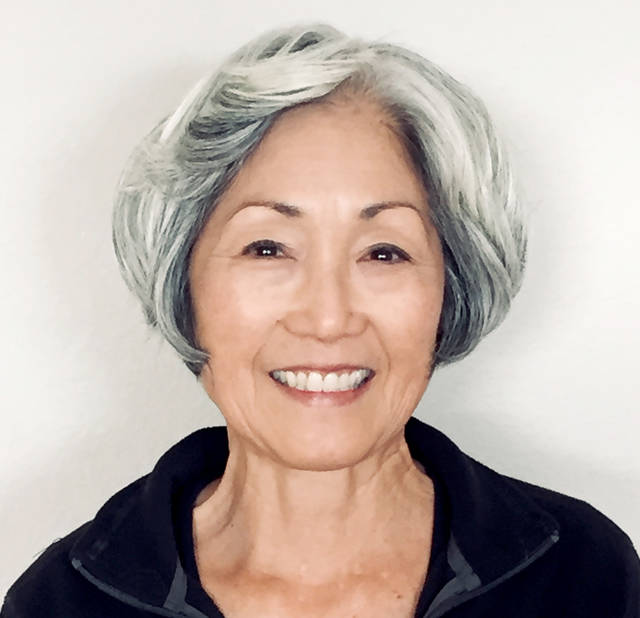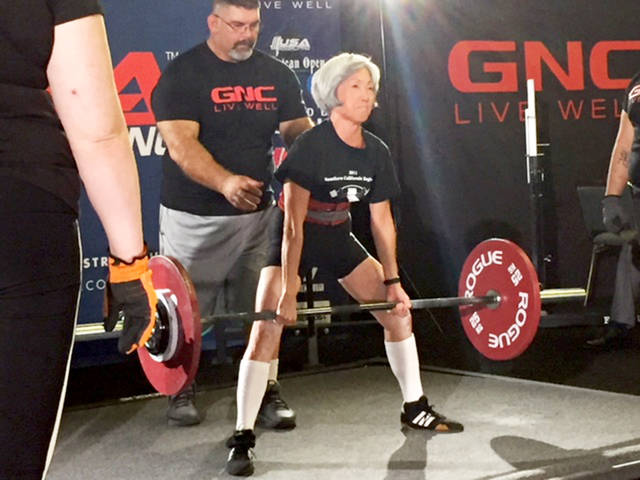Talk story with Stephanie Misaki Whiting

Contributed photo
Stephanie Misaki Whiting

Photo courtesy Stephanie Misaki Whiting
Stephanie Misaki Whiting deadlifts 204 pounds during the USA Powerlifting Open competition in Anaheim, Calif., on Dec. 8.
Many years ago while living in the Midwest, Stephanie Misaki Whiting joined a strength training class.
Many years ago while living in the Midwest, Stephanie Misaki Whiting joined a strength training class.
Because of it, she would dedicate much of her life to the sport of powerlifting, and not just by competing — though she still does at 69.
Earlier this month, she took part in the USA Open in Anaheim, Calif., competing in the 104-pound weight class, which was her 75th competition entered in 35 years at the state, national and international levels.
Whiting, a resident of Kauai since 2008, has created a legacy in the sport.
For years, not only did she teach and coach, she also worked toward making powerlifting a drug-free sport.
In 2007, she was inducted into the USA Powerlifting Women’s Hall of Fame for those contributions.
Whiting spoke with The Garden Island over the phone from Reno, Nevada, and talked about her early experiences, her most recent competition, her work toward making powerlifting a drug-free regulated sport and what drives her to still compete today.
What first interested you about powerlifting?
I had always been interested in lifting weights, but we were never in a place back then where they offered it. And then after my husband left the Navy, we settled in Wisconsin, and a local YMCA had a class.
I took it. It was overall strength training, but it included the three powerlifts: the squat, the bench press and deadlift. I enjoyed it. I liked the challenge and just seeing what good training results get me. I wasn’t a natural athlete at all. I was really interested in fitness. So, I just wanted to see how could I do.
So, are you from Kauai?
No, actually. My background is I’m Japanese-American. In World War II, my family was interred at Tule Lake, in a relocation camp. My father was in the MIS, the Miltary Intelligence Service. After the war, my folks settled in the Midwest. I grew up in Chicago.
We (my husband and I) visited Hawaii and we thought, “That’s where we want to live.” But due to work and circumstances, we were in the Midwest. Always vacationing over the years in Hawaii. When he retired, then we moved.
Were there a lot of women interested in the sport back then?
No, not a whole lot of women. But it’s progressing. There’s weight categories all the way from — there used to be 97 (pounds), but they don’t have that category anymore — but it started from very lightweight all the way to 181-plus. And so when I did see the smaller women, I was quite encouraged. But, no. Back then, there weren’t a whole lot of women. But it’s really grown.
Around what time did you see the growth in women participants?
I guess the initial start would have been in the ‘80s. It’s grown quite a bit over the years. I think probably with the younger folks these days, they’re really into fitness with CrossFit and things like that. It seems like a natural thing these days for women to be in the weight room, where it wasn’t that way at all (back then).
When did you first start competing?
My first competition was in 1983. … That really got me hooked, and I wasn’t really that young. I was 34 when I started. But I saw other women older than me. So, that was encouraging. In a way, we all became friends.
We were living in Wisconsin at that time. Back then, the competitions we went to were generally in the Midwest.
What’s it like competing compared to just working out or training?
Well for me, it’s a matter of, “What are the results of my training? How has my technique (improved) so that I can function better in the lift?” What has helped me over the years is, I use a meditative technique. My background, I’m a licensed mental health counselor. I use a lot of meditative practices for myself and for the patients that I see.
So when it all boiled down to the lift in competition, I take a couple of breaths and I let go of any thoughts. If you’re thinking of, “Got to do this. Got to do that,” you’re not present. You’re not in your body. What I’ve learned over the years is to let go of that. Just take a couple of breaths and do the lift.
As far as competing against other women, sometimes it’s a matter of who shows up — someone stronger than you or maybe the whole group is not as experienced so they don’t lift as much.
For me, it’s always been about how I’m going to be doing compared to the past me.
Though the beginning years, I got stronger. My technique got better. Then you reach a certain age — I would say about 50, just through the natural aging — you can’t lift as much.
Then it’s the other side of the experiment. “OK, now I’m 50. Now, I’m 55, 60, 65. What happens? How can I still do this?”
The USA Open in Anaheim, how did you do?
What they call the “Master Lifters” is age 40 and above. And within that, they have Master 1, which is 40-49. Master 2, which is 50-59. I’m in Masters 3, which is 60-69. There’re very, very few women power lifters in that category. So there’s not that much competition, so to say.
So what was exciting for me is that the past few years, my lifts have remained steady. Naturally disappointed because I can’t lift nearly as much as I used to. But in last week’s meet, I increased my deadlift. That was due to training a different way, and it worked for the deadlift. So, I’m motivated by that.
Could you talk about your efforts to make the sport drug-free?
Back then, I was in the field of health and wellness. I was at the University of Wisconsin. Back then, in the early ‘80s when I started, there was a lot of drugs in the sport. All kinds. Not just steroids, but diuretics. People would make weight that way. Or amphetamines so they could get extra energy. That’s just not the idea of sport.
It was not only me. It was a group of women that (believed) there should be drug testing. We worked hard to get that implemented into one of the national organizations. Today, that organization, USA Powerlifting, it’s the largest. They have over 18,000 members. It’s really grown. A lot of that is due to, it’s very well-organized and administered. They drug test in every competition 10 percent of the lifters. They also have out-of-meet testing. They are under WADA, the World Anti-Doping Agency. That’s what we follow.
You must be proud that your efforts then influence the sport today.
Yeah, because sport is supposed to be healthy. How can that be if there are all kinds of drugs?
And also, you were a referee? Do you still referee?
No. As far as administrative things like that, I let go of those thing when I was (in my early 50s). Yeah. I went back to graduate school, again, and got a degree in counseling psychology. Then my profession changed, and I devoted my energies to mental health counseling. I started, probably, mid-’80s until ‘90s. Maybe 15 years. … I was my motivation to help the sport grow. In order to do that, they needed more officials.
Also, you’re a hall of famer. What was that like?
I’ll tell you this. Being in the hall of fame, it’s not so much that I was a really, really great lifter. I wasn’t. I did well, but there were women who were amazingly strong. Today, there are many. That’s their natural gift, or they really worked at it through other sports and then came to powerlifting.
I feel like my part was seeing what needed to be done and accepting the responsibility of helping this sport grow — making it an actual sanctioned (sport) governed by rules.
For how much longer do you see yourself entering competitions?
I was asking myself that question when I was training for this meet in California. As I got older, training becomes more difficult — just the strain because the body doesn’t bounce back as well. I was wondering, “Maybe this should be the last one.” But because I did better in the deadlift, and this happens every time, I just get more motivated. My plan is not that far out, but just to train now and see maybe in the next competition.
A lot of it has to do with my work. Probably next year in the fall, and I’ll go to Southern California, the competitions that they have there.

